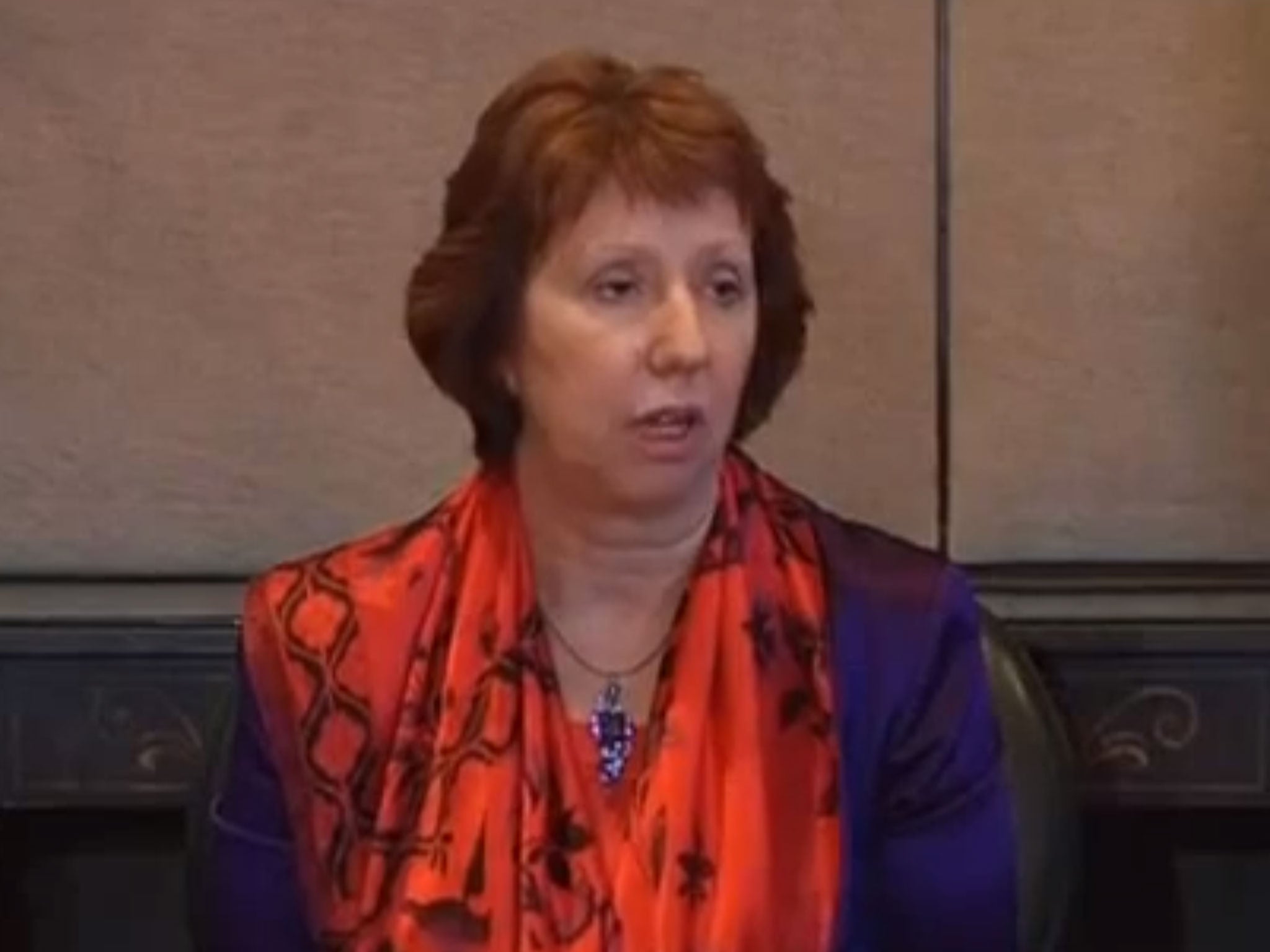EU’s top diplomat, Baroness Ashton, in ‘friendly’ talks with ousted Egyptian president Mohammed Morsi, as protests continue
The deposed president’s detention goes on, as his supporters suffer violence

Your support helps us to tell the story
From reproductive rights to climate change to Big Tech, The Independent is on the ground when the story is developing. Whether it's investigating the financials of Elon Musk's pro-Trump PAC or producing our latest documentary, 'The A Word', which shines a light on the American women fighting for reproductive rights, we know how important it is to parse out the facts from the messaging.
At such a critical moment in US history, we need reporters on the ground. Your donation allows us to keep sending journalists to speak to both sides of the story.
The Independent is trusted by Americans across the entire political spectrum. And unlike many other quality news outlets, we choose not to lock Americans out of our reporting and analysis with paywalls. We believe quality journalism should be available to everyone, paid for by those who can afford it.
Your support makes all the difference.For nearly a month, deposed President Mohamed Morsi has been held under military detention while scores of his Muslim Brotherhood supporters were gunned down in his name.
Today, the former Egyptian leader received his first visit from the outside world when Catherine Ashton, the EU’s top diplomat, was granted access in order to push for a negotiated solution to Egypt’s deepening crisis.
According to Baroness Ashton, the EU’s foreign policy chief, Mr Morsi is “well” and the two had a “friendly, open and very frank” discussion.
She revealed Egypt’s most high-profile detainee had been allowed by his captors to peruse the Egyptian newspapers – most of which have for the past three weeks been printing smears portraying the Muslim Brotherhood as a terrorist organisation.
“We were able to talk about the situation and we were able to talk about the need to move forward,” she said, but refused to reveal any more details about the conversation. Oddly, she said that she had been able to see the facility where Mr Morsi is being held – but still did not know where he was. The former President has been held incommunicado since being ousted on 3 July.
On Friday prosecutors announced that he was facing a series of criminal charges relating to an alleged conspiracy involving the Palestinian group Hamas. The case concerns a jailbreak in the early days of the 2011 uprising when Mr Morsi was sprung from jail.
Baroness Ashton’s visit is her second to Cairo since the coup – which was backed by large-scale protests – earlier this month. Along with senior figures from the Muslim Brotherhood, she held discussions with members of the interim government and General Abdel Fattah al-Sisi, Egypt’s top military commander and coup leader. In recent weeks the general has gained a loyal following among Egyptians who have warmed to his increasingly strident profile. Ever since he delivered last week’s speech calling for a popular mandate to crack down on “terrorism”, observers have been expecting a strike against members of the Brotherhood.
Scores of Islamists have already been massacred by troops and security personnel in separate attacks this month, yet many Egyptians appear either unconcerned or accuse the Brotherhood of provocation.
Amal Sharaf, an activist who met Baroness Ashton on Monday, is a leading member of the April 6 youth movement, the influential protest group which helped spearhead the 2011 revolt. She told The Independent that in her eyes the Brotherhood was a “terrorist” organisation. “The army is doing its best to try and stop violence,” she said. “There are not many people that would accept having an armed sit-in in their country,” she added, referring to accusations that pro-Morsi protesters habitually carry weapons.
Baroness Ashton’s visit is designed to bridge the widening chasm between Egypt’s warring factions, but the growing enmity makes such a prospect increasingly difficult. The walls of the British embassy in Cairo are currently scrawled with graffiti labelling Gen al-Sisi a traitor – a mark of how deeply betrayed many Brotherhood supporters feel about the recent course of events. There are Reports of men being attacked or abused for growing long, Islamist-style beards. Ahmed al-Anani, a member of the Egyptian Social Democratic Party, told The Independent how a female friend was insulted recently and called a faajira, or whore, as she drove past a pro-Morsi rally with uncovered hair.
“What’s happening in society now is this type of polarisation,” he said, “where people think that anyone who is from the Brotherhood or who has a beard is a terrorist. This is totally unacceptable. This is why the solution cannot be a security solution. The solution has to be political.”
Join our commenting forum
Join thought-provoking conversations, follow other Independent readers and see their replies
Comments